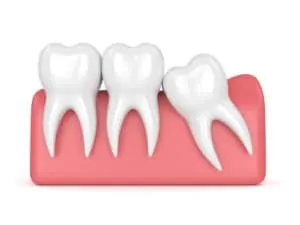
Wisdom teeth are usually first seen on dental x-rays during routine appointments with your dentist in El Paso. Typically your dental team can see them before you even know that they’re starting to work their way to surface. This is also when we can most likely tell if they’re going to need to be removed. Most of the time, they will need to come out. In fact, 90% of Americans have their wisdom teeth removed. But what happens if you don’t have your wisdom teeth extracted?
The top reason why most wisdom teeth need to be removed is that there’s simply not enough room in the mouth for these new teeth. Your dental x-rays will show your dentist whether or not there will be enough space for your wisdom teeth. However, if your mouth doesn’t have adequate room and you do not have your wisdom teeth removed, it can lead to overcrowding, crooked teeth, or even an impaction. Having impacted wisdom teeth essentially means that the teeth are stuck in your bone below the gum line. This can be very painful and increases the risk of infection.
Wisdom teeth also have a funny way of working themselves sideways and start to come through horizontally rather than vertically through the gums. If this occurs, nearby healthy teeth can be seriously damaged and your bite can be affected, causing larger, more serious, and painful problems.
Let’s say your wisdom teeth develop perfectly and there’s room for them in your mouth. While rare, it does happen. If you’re one of the few that can keep their wisdom teeth, problems may still find you in the future. Wisdom teeth are way in the back of the mouth which makes them very difficult to properly care for. If proper oral hygiene isn’t maintained, teeth can decay and the risk for gum disease increases.
Maintaining regular visits to our El Paso dental office not only helps protect your existing teeth from decay, but these appointments can also help us identify whether your wisdom teeth should be removed before any problems arise. If your wisdom teeth do need to be removed, don’t worry. The procedure is incredibly common and your dental team will do everything they can to keep you comfortable during and after treatment.
He was excellent and pulled my wisdom tooth in less than 2 min. w/o chipping it. The service was good too.
Great dentist experience! While they do take my insurance, unfortunately, they are not part of my network, however, I liked them so much I will continue to see them.
We were very impressed with the helpful and friendly staff at this dental office.
I was very impressed and thankful with the service provided.
I’m 60 years old and I hated to go to the dentist, and put off going for a long time. But let me tell you Dr. Rizk is the best dentist I’ve ever had. I would of gone years ago. A no pain Dr. – thank you!
October is not just about pumpkins and Halloween – it’s also National Dental Hygiene Month! This month serves as a reminder of the importance of maintaining good oral hygiene for a healthy smile. At our dental office in El Paso, we want to help you understand the value of dental... Read More...
October is Breast Cancer Awareness Month, a time dedicated to spreading awareness about breast cancer, its prevention, and the importance of early detection. But did you know that breast cancer can also impact your oral health? Understanding this connection is crucial, especially for those undergoing treatment or in remission. Let’s... Read More...